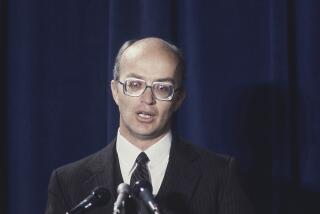Reagan Aide Watt Pleads Guilty to Misdemeanor
- Share via
WASHINGTON — In a sharp scaling down of the original charges, former Interior Secretary James G. Watt pleaded guilty Tuesday to a misdemeanor count of attempting to mislead a grand jury that was investigating influence peddling at the Department of Housing and Urban Development.
Watt, 57, faces a maximum punishment of up to six months in jail and a $5,000 fine, which he agreed to pay in plea bargaining discussions with the government. This does not foreclose Watt’s being sent to jail on March 12, the date set by U.S. District Judge Royce Lamberth for sentencing after completion of a probation report.
“It’s totally out of our control,” said Watt’s lawyer, William Bradford Reynolds, who nevertheless expressed satisfaction that the resolution of the lobbying case was “at least close to what it should have been.”
The single misdemeanor sharply contrasts with the 25 felony counts that a federal grand jury lodged against Watt on Feb. 22. Those counts included perjury, obstruction of justice and hiding subpoenaed documents dealing with his alleged role in the HUD scandal of the Reagan administration.
Watt was accused of using his HUD political connections to help his clients obtain millions of dollars in low-income housing funds. After resigning as Interior secretary in 1983, Watt became a consultant who helped private clients seeking federal funds for housing projects in Maryland, New Jersey, Massachusetts, Puerto Rico and the Virgin Islands.
In pleading guilty, Watt admitted he attempted to improperly influence the grand jury in a written response to a subpoena for documents by the panel. Watt, in a letter to an FBI agent, “set forth inaccurate information,” said Michael Sullivan, an associate independent counsel in the HUD investigation.
“He stated that he had few documents responsive to the subpoena and that the documents he did have were likely of marginal, if any, relevance to the grand jury investigation,” the office of independent counsel Larry D. Thompson said in a statement.
“At the time he wrote the letter, however, Watt knew that he had documents in his possession that could be of relevance to the grand jury,” the statement said. “He did not produce those documents.”
Reynolds attributed the willingness to reduce the charges to Thompson, who after succeeding the original HUD independent counsel, Arlin Adams, in June, brought in new prosecutors who reevaluated the charges.
After “a lot of discussions, we came to a place he [Thompson] felt he could come and I felt I could go,” Reynolds said. “It’s hard to get somebody to walk [free] when they blast you originally with 25 felony counts.”
Thompson, however, contended that Watt’s plea “establishes that persons who attempt to influence the actions or decisions of an investigating body by making inaccurate statements to them must and will be held responsible for such statements.”
He said the plea agreement “advances the interest of the government in avoiding protracted litigation.”
Watt, who now lives in Jackson Hole, Wyo., was one of President Reagan’s most controversial Cabinet officers. He resigned in 1983 after a furor over his describing members of a federal advisory panel as “a black . . . a woman, two Jews and a cripple.”
After his indictment, on which he faced up to 125 years in prison, Watt initially declared his innocence and vowed to fight the charges. “With truth as my weapon, I will stand and fight,” he said then in a written statement. “I am trusting God that justice can arise and will prevail.”
More to Read
Sign up for Essential California
The most important California stories and recommendations in your inbox every morning.
You may occasionally receive promotional content from the Los Angeles Times.











